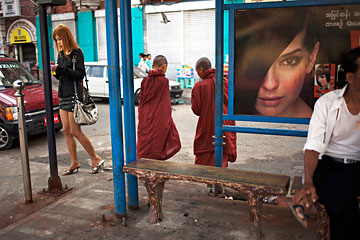
Changing fashions on the streets of Rangoon could portend a new era of consumerism
William Selig had scoped out investment opportunities in Mongolia. There was a uranium mine in Kyrgyzstan that also held promise. But on a trip to Thailand in 2011, a friend sold the New York native on the isolated, impoverished country next door: Burma, also known as Myanmar. "He said that it's going to be bigger than anything you've ever seen before," Selig recalls. By January 2012, he had moved to Rangoon, the country's largest city, to start a firm that shepherds foreign investment. "I expected to spend two years just setting up shop," he says, "but we're already doing business."
Daily power cuts, cratered roads and Burma's ranking as one of the world's least transparent economies haven't diminished Selig's enthusiasm. "Any emerging market is exciting, but the scale of Myanmar is just massive," he says, reeling off its treasures, which include the world's largest caches of jade, rubies and teak, plentiful gas reserves and a population of some 60 million, desperate to reclaim Burma's former glory as a wealthy trading hub.
In the middle of the past century, airlines flying from West to East would routinely stop in Rangoon, a polyglot city that defined globalization long before the word gained vogue. Today, foreign executives are again touching down, eager to explore an untapped market shuttered for nearly 50 years by self-imposed seclusion and socialist-style mismanagement. In recent years, cowboy capitalists have sought the next frontier market in Mongolia, Romania, Honduras and Mozambique, among others. Now it's Burma's turn.
The once reclusive military regime began in 2011 to launch reforms that have opened up this resource-rich land. In April 2012, parliamentary by-elections ushered in opposition legislators, including veteran democracy campaigner Aung San Suu Kyi, who had spent most of two decades under house arrest. Western governments have responded by suspending or lifting sanctions imposed on the regime for its appalling human-rights record. (Asian nations like China, Singapore and Thailand have long invested in the country.) "I first came as a visitor four years ago," says Briton Andrew Rickards, who in November 2011 took over as CEO of Yoma Strategic Holdings, a local conglomerate founded by Hong Kong — Burmese businessman Serge Pun. "I made up my mind in a day or two that in my lifetime there wasn't going to be another country that was so far behind that could catch up so fast given a few crucial changes at the top."
Google's Eric Schmidt visited in March, and George Soros, who has poured millions of dollars into pro-democracy initiatives in Burma, is part of a joint bid for a lucrative telecoms license. CEO Howard Schultz predicts that Starbucks will be caffeinating the country within a couple of years. KFC may move in sooner, while Heineken, Carlsberg, PepsiCo and Coca-Cola are already committed. Automaker Ford also announced its return last month. The latest foreign-investment figures show a fivefold jump in the 2011 to '12 fiscal year, mostly in the garment industry. This year, the increase should be far higher. On May 20, Burma's President Thein Sein, once banned by the U.S. because of his membership in the junta, was welcomed in Washington by U.S. President Barack Obama, who spoke of "the prospect of increasing trade and investment in Myanmar."
It's hard to sufficiently underline just how quickly Burma is transforming. Little more than two years ago, the country cowered under a xenophobic junta that spent nearly half a century bankrupting what was once the world's largest exporter of rice. For decades, private business had been a perilous enterprise — although, in the latter years, a clique of top brass and their cronies fed on Asian investment that came with no human-rights strings attached. Western sanctions further detached Burma from the modern world, despite its strategic positioning between India and China. Back then, Burma boasted no billboards for Samsung gadgets or L'Oreal mascara. Government restrictions meant that mobile SIM cards could cost $4,000. (Mobile-phone penetration is below 10%, compared with 85% worldwide.) Some ordinary cars sold for upwards of $100,000 in a country where the average person lives on $3 a day. And Burma was a place of fear. "When I used to come back to visit, I would clean out my computer because if I was caught with anything considered pro-democracy, I could be arrested," says Min Zar Ni Lin, an economic researcher and one of hundreds of white collar exiles who have returned in recent months.
Today, in Rangoon, also called Yangon, citizens openly trade political gossip and censorship no longer straitjackets newspapers. Gleaming Toyota Land Cruisers are replacing wheezing sedans of 1980s vintage. Everything seems under construction. Jackhammers provide the percussive backdrop in neighborhoods once more attuned to the footfall of Buddhist monks collecting alms. An arcane system of multiple currency-exchange rates has been abolished and banking reform initiated.
"I never imagined I'd live here," says Ivan Pun, Serge Pun's son, who, like so many scions of the country's elite, grew up overseas. But after a stint studying at Oxford, apprenticing in New York City and hanging out in Beijing, Pun took another look at the country that made his father rich. Now the 28-year-old works in corporate development for Yoma, which focuses on real estate, tourism and banking. The company is deluged daily with requests to partner foreigners in everything from importing secondhand cranes to setting up motels. "It's all changed so fast," he says, sipping an iced latte. "It's like these things that normally take years or decades happened in a few months."
